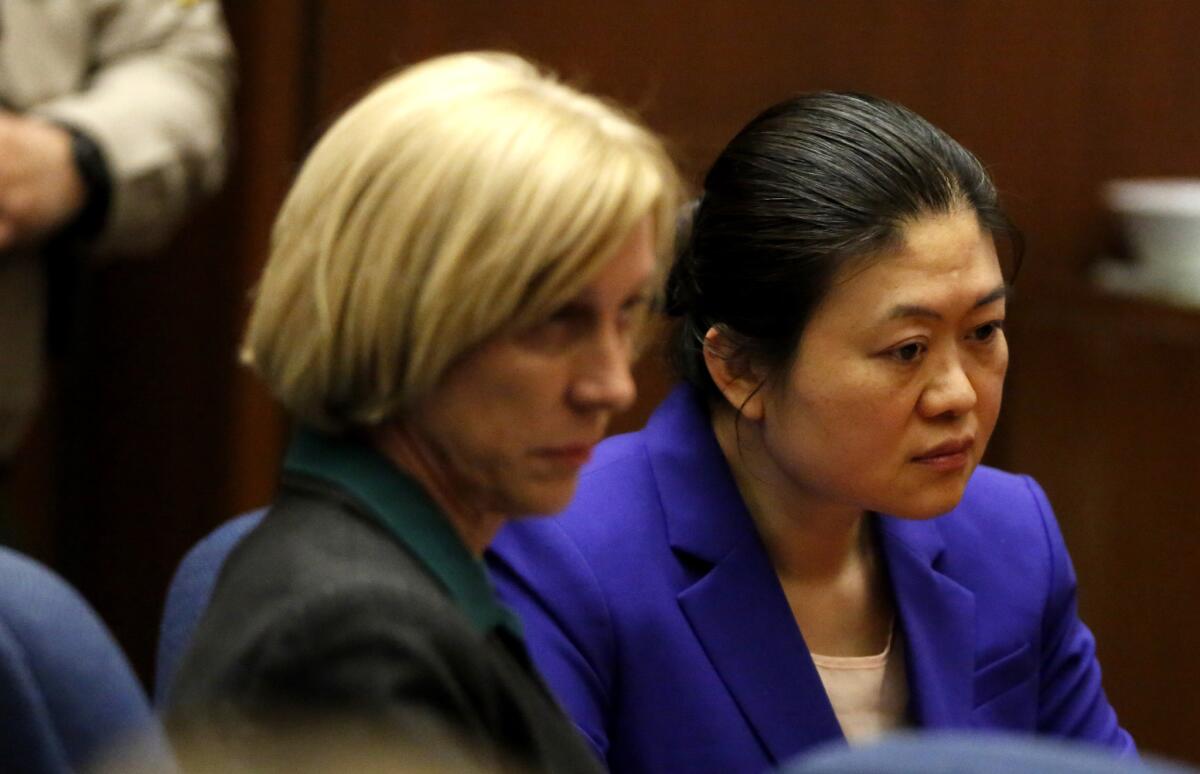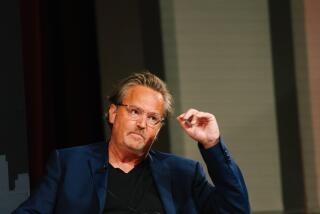California doctor convicted of murder in overdose deaths of patients

Rowland Heights doctor Hsiu-Ying “Lisa” Tseng and her attorney Tracy Green, left, listen as Tseng was convicted of second-degree murder on Friday, for the drug-overdose deaths of three of her patients.
A Rowland Heights doctor was convicted of second-degree murder Friday in connection with the overdose deaths of three patients, capping a landmark case that was closely watched by medical and legal professionals across the country.
Dr. Hsiu-Ying “Lisa” Tseng, who prosecutors say is the first doctor convicted of murder in the United States for recklessly prescribing drugs to patients, was accused of ignoring “red flags” about her prescribing habits, including the overdose of a patient in her clinic and nine phone calls in less than three years from authorities informing her that patients had died with drugs in their system.
As the jury’s decision was read, Tseng cocked her head and listened, showing no emotion.
“The message this case sends is you can’t hide behind a white lab coat and commit crimes,” Deputy Dist. Atty. John Niedermann said afterward. “A lab coat and stethoscope are no shield.”
April Rovero, whose son, Joey, died nearly six years ago after mixing alcohol with Xanax and oxycodone he had obtained from Tseng, said she believes the verdict will resonate throughout the country.
“I really hope this sets a precedent that will allow other dirty doctors to be prosecuted,” said Rovero, who blogged daily throughout the trial. “We feel that finally we have justice.”
She wrote them a prescription for the very thing they’re addicted to. She shoved them over that cliff.
— Deputy Dist. Atty. John Niedermann
She warned against simply blaming addicts when physicians are in a position to know the harm their prescriptions can bring.
“Addicts and people seeking medications aren’t in control,” Rovero said. “Doctors are the ones who are supposed to push back. They have a duty.”
Tseng’s mother, who declined to give her first name, said through an interpreter that her daughter was deceived by drug-seeking patients.
“My daughter is someone who loved to save lives,” she said, crying and shaking her fists outside the courthouse. “She always believed in her patients, and always tried to help her patients. She’s innocent of all these accusations.”
Jurors deliberated two weeks before reaching their verdicts. The eight-week trial included 77 witnesses and more than 250 pieces of evidence as the prosecution argued that Tseng had plenty of warnings that her prescription practices were dangerous.
Niedermann told jurors that Tseng agreed to give patients powerful narcotics without asking follow-up questions even after some — including an undercover agent posing as a patient — told her about their drug addictions.
“She wrote them a prescription for the very thing they’re addicted to,” Niedermann said.
“She shoved them over that cliff.”
Tseng’s defense lawyer portrayed the doctor as overworked and too trusting of her patients.
“She got in over her head,” attorney Tracy Green told jurors.
Although the state’s medical board had found Tseng, 45, in violation of some standards, Green said that didn’t mean her client’s actions were criminal.
“That’s what malpractice cases are about,” Green said. “She did not murder people.”
After Friday’s verdict, Green said her client was shocked by the conviction and plans to appeal. She said prosecutors used a long list of charges involving other patients to unfairly portray Tseng as a reckless doctor responsible for the three overdose deaths.
The verdicts could have a terrible ripple effect, she said. Green said she has received several calls from cancer patients and others with terminal illnesses who said the prosecution of doctors like Tseng has led other physicians to limit the amount of powerful painkillers they prescribe, even to those who have a medical need for them.
“It’s pretty hard to figure out who is an addict and who is not,” Green said.
Tseng was one of only a handful of doctors across the country who have faced murder charges for prescribing painkillers that led to a patient’s death. Last month, a Florida physician was acquitted of first-degree murder in a patient’s fatal overdose.
Other doctors have faced lesser charges. In 2011, a Los Angeles County jury convicted Dr. Conrad Murray of involuntary manslaughter for giving pop legend Michael Jackson a surgical anesthetic that killed him.
The medical world kept a close eye on Tseng’s trial. Some experts worried that a conviction would have a chilling effect on worried doctors and keep powerful painkillers from patients who need them.
Prosecutors charged Tseng with murder for the deaths of Vu Nguyen, 28, of Lake Forest; Steven Ogle, 25, of Palm Desert; and Joey Rovero, 21, an Arizona State University student who prosecutors say traveled more than 300 miles with friends from Tempe, Ariz., to obtain prescriptions from Tseng at her Rowland Heights clinic.
Tseng was also accused of prescribing drugs to people with no legitimate need for the medications and fraudulent prescribing for writing a man’s name on prescriptions so his wife could double her pill count.
The jury found Tseng guilty of more than a dozen illegal prescribing counts. Jurors hurriedly left the courthouse after the verdict without talking to reporters.
A 2010 Times investigation found that at least eight of Tseng’s patients died of overdoses from the same type of drug she prescribed to them.
See the most-read stories this hour >>
The investigation also found that Tseng’s patients included at least three people who had been charged with dealing drugs and a fourth who was suspected by police of doing so.
In interviews with The Times, two others admitted dealing drugs prescribed by Tseng, and family members of several dead patients said they suspected their loved ones sold some of their prescription pills to finance their habits.
During the trial, Niedermann told jurors that the grandmother of one of Tseng’s patients called the clinic and yelled at the doctor, demanding that she stop prescribing medication to her grandson. Another patient’s father called the clinic in 2010, the prosecutor said, and made the same demand, calling Tseng a “drug pusher.”
Tseng noted the call in medical records, including a reminder not to see the patient in the future.
During closing arguments, the prosecutor highlighted the testimony of Dr. Gene Tu — Tseng’s husband who has also faced medical board discipline.
Tu testified that phone calls from coroner’s officials informing Tseng that her
patients had overdosed “didn’t create an issue in the office.”
The prosecutor argued that Tseng didn’t care about her patients’ treatment and sometimes referred to them as “druggies.” For her, he said, it was about “dollars and cents.”
Between 2007 — the year Tseng joined the Rowland Heights clinic where her husband worked — and 2010, Niedermann said tax returns show that their office made $5 million.
“Why would somebody do this?” the prosecutor asked, glancing at Tseng. “Five million reasons.”
Tseng’s attorney argued that her client’s actions weren’t motivated by the money.
Although Tseng “could’ve practiced medicine better,” Green said, Tseng cared about her patients and often explained to them that they didn’t need the types of drugs they wanted.
“She’s not just giving them out,” Green said. “She’s warning them how dangerous they are.”
Toward the end of the trial, the prosecutor projected images of some of the victims — round-faced young men with similar shaggy haircuts — onto a screen.
“These are people’s kids,” Niedermann said.
For more news from the Los Angeles County criminal courts, follow @marisagerber.
ALSO
Death penalty supporters propose measure for 2016 ballot
Jerry Heller sues over his portrayal in ‘Straight Outta Compton’
Beverly Hills water wasters ‘should be ashamed,’ state regulator says
More to Read
Sign up for Essential California
The most important California stories and recommendations in your inbox every morning.
You may occasionally receive promotional content from the Los Angeles Times.













